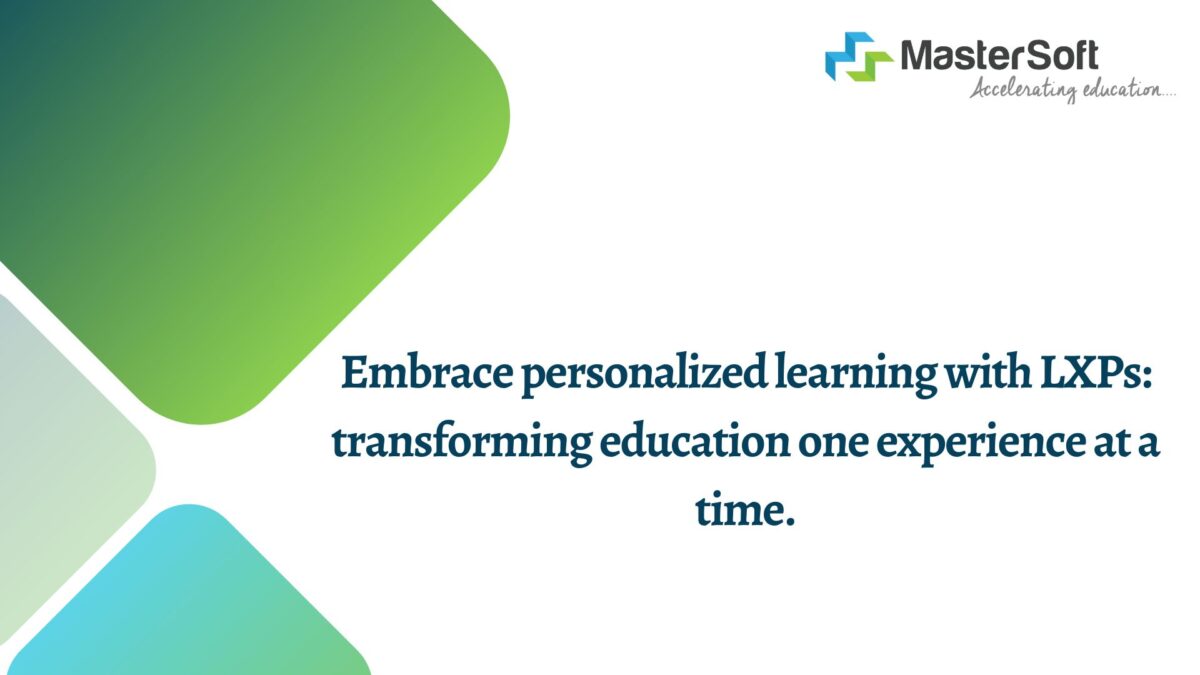Traditional Training to Personalized Learning: The LXP Revolution

In the dynamic landscape of education, traditional training methods are giving way to a new paradigm – personalized learning facilitated by Learning Experience Platforms LXP This blog explores the transformative journey from traditional training to personalized learning, driven by the LXP revolution.
Understanding Traditional Training Methods
Traditional training methods have long been the cornerstone of educational and professional development programs. These methods typically involve instructor-led sessions, standardized curriculum, and passive learning environments. In such settings, learners are often presented with pre-determined content and expected to absorb information without much interaction or customization. While traditional training methods have been effective to some extent. They often fall short in meeting the diverse needs and preferences of modern learners. Moreover, the static nature of traditional training can lead to disengagement, low retention rates, and limited applicability to real-world scenarios. As the educational landscape evolves and learner expectations shift. There is a growing recognition of the need to move beyond traditional training methods towards more dynamic and personalized learning experiences.
The Rise of Learning Experience Platforms (LXPs)
Amidst the shortcomings of traditional training methods emerges a new approach to learning facilitated by Learning Experience Platform (LXPs). LXPs represent a paradigm shift in the way individuals engage with educational content, emphasizing learner-centric approaches and interactive experiences. Unlike traditional training methods, which follow a one-size-fits-all approach, LXPs prioritize personalization, flexibility, and engagement. These platforms leverage technology to curate tailored learning pathways, deliver dynamic content, and foster collaboration among learners. By providing a centralized hub for accessing resources, participating in discussions, and tracking progress, LXPs empower learners to take ownership of their learning journey and achieve their educational goals more effectively.
Key Features of LXPs
LXPs offer a wide range of features designed to enhance the learning experience and differentiate them from traditional training methods. One key feature is content personalization, where LXPs leverage data analytics to deliver targeted content recommendations based on individual learning preferences, past performance, and areas of interest. Adaptive learning pathways are another notable feature, allowing learners to progress through courses at their own pace and receive personalized feedback and support along the way. Social learning capabilities enable learners to collaborate with peers, share insights, and participate in discussions, fostering a sense of community and engagement. Advanced analytics within LXPs provide instructors and administrators with valuable insights into learner behavior, performance metrics, and course effectiveness, enabling continuous improvement and optimization of learning experiences. Overall, the key features of LXPs empower learners to engage with content in meaningful ways. Personalize their learning journey, and achieve better outcomes compared to traditional training methods.
Key Features of LXPs
Learning Experience Platforms (LXPs) offer a plethora of features tailored to enhance the learning journey and set them apart from traditional training methods. Content personalization is a cornerstone feature, wherein LXPs leverage sophisticated algorithms and user data to curate bespoke learning experiences. By analyzing learner preferences, past interactions, and performance, LXPs deliver targeted content recommendations, ensuring relevance and engagement. Adaptive learning pathways further augment this personalization by allowing learners to progress at their own pace, receive customized feedback, and access supplementary resources based on their proficiency and learning objectives. Social learning capabilities within LXPs foster collaboration and peer-to-peer interaction,. Elearners to share insights, participate in discussions, and collaborate on projects in real-time. Additionally, advanced analytics empower instructors and administrators to gain valuable insights into learner behavior, track progress, and identify areas for improvement. By leveraging these key features. LXPs create a dynamic and interactive learning environment that caters to the diverse needs and preferences of modern learners.
Personalization in Learning
Personalization is at the core of the LXP revolution, offering learners tailored experiences that cater to their unique learning styles, preferences, and objectives. Through data-driven insights and AI-driven algorithms, LXPs deliver personalized content recommendations, adaptive assessments, and customized learning pathways. Learners have the flexibility to explore topics at their own pace, delve deeper into areas of interest, and receive targeted support and feedback along the way. This personalized approach not only enhances engagement and motivation but also maximizes learning outcomes by addressing individual knowledge gaps and building upon existing competencies. Furthermore, personalization fosters a sense of ownership and empowerment among learners. Empowering them to take control of their learning journey and achieve their educational goals more effectively.
Enhancing Engagement Through Interactivity
Interactivity is crucial for maintaining learner engagement and fostering active participation in the learning process. LXPs incorporate various interactive elements such as quizzes, simulations, games, and virtual labs to make learning more immersive, enjoyable, and effective. These interactive experiences not only capture learners’ attention but also provide opportunities for hands-on learning, problem-solving, and critical thinking. Gamification elements, such as badges, leaderboards, and rewards, further incentivize participation and motivate learners to strive for excellence. Moreover, interactive assessments enable instructors to gauge learners’ understanding in real-time, identify areas of improvement, and tailor interventions accordingly. By enhancing engagement through interactivity, LXPs create a dynamic and stimulating learning environment that inspires curiosity, creativity, and lifelong learning.
Bridging the Gap with Microlearning
Microlearning, characterized by short, bite-sized learning modules, aligns seamlessly with the flexible nature of LXPs. These platforms enable organizations to deliver microlearning content in various formats, catering to the on-the-go learning preferences of modern learners.
The Future of Learning with LXPs
As technology continues to evolve, the future of learning with LXPs holds immense promise. With advancements in AI, virtual reality, and augmented reality, LXPs will continue to innovate and transform the educational landscape. Empowering learners to thrive in a rapidly changing world.
Conclusion:
In conclusion, the LXP revolution marks a significant shift from traditional training to personalized learning. Offering learners a dynamic and engaging educational experience. As organizations embrace LXPs, they unlock the potential for continuous improvement, innovation, and success in the ever-evolving field of education.
Read More Blog Here






